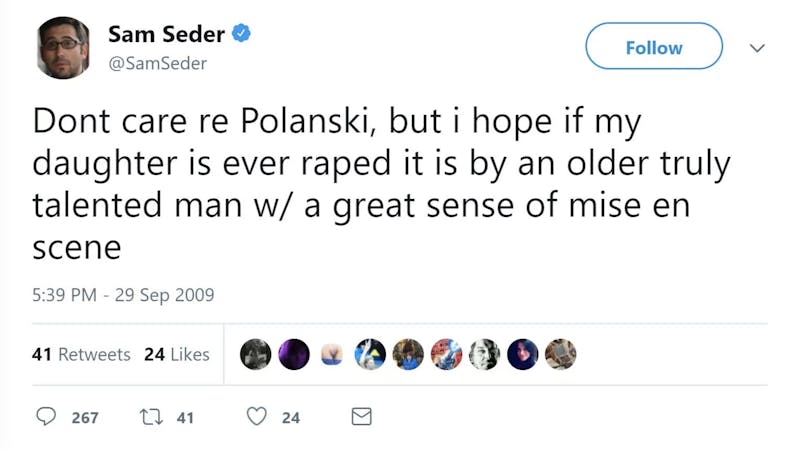The tweet was clearly meant to scare me. Jack Posobiec, an alt-right bottom-feeder best known for promoting the Pizzagate and Seth Rich conspiracy theories, issued this ominous warning on November 25:
It will soon be @HeerJeet’s time in the barrel
— Jack Posobiec 🇺🇸 (@JackPosobiec) November 26, 2017
Posobiec is an ally of the notorious Roger Stone, famed for his political dirty tricks, and the tweet echoed the phrase “time in a barrel,” which Stone had tweeted prior to scandals breaking out about Democratic Party bigwig John Podesta (the Wikileaks email leak) and Senator Al Franken (the accusations of sexual assault). I wondered what Posobiec could possibly have on me. The most shocking thing about my emails is my tardiness in answering them; I have hundreds of orphaned missives in my “drafts” folder. My sex life, for better or worse, is hardly tabloid material. And I have never sexually harassed anyone. Maybe Posobiec, being a fabulist, was planning on inventing a lurid tale of depraved behavior?
Posobiec’s smear job, which came a few days later, was weak tea. He had dug up some tweets I had written in 2014 and 2016 offering a partial defense of conservative political scientist Tom Flanagan and fired Nintendo employee Alison Rapp, both of whom had heterodox opinions on child pornography. In my tweets, I argued that the law should distinguish between child porn that is a work of the imagination (where no one is harmed in the production) and child porn that is a work of reproduction (where actual children are hurt); that possession of child porn might best be dealt with through therapy rather than jail; and that Flanagan and Rapp shouldn’t be fired for arguing for changes in child porn laws. Posobiec spun this into a defense of child porn, and argued that I was a hypocrite for criticizing Alabama senatorial candidate Roy Moore, who faces multiple credible accusations of child molestation.
We live in an age of weaponized outrage, where bad faith actors use out of context statements to get people fired. But I had little to fear from Posobiec’s attack, not just because he was attacking perfectly reasonable opinions. I was also safe because my employer, The New Republic, is secure in its identity as a journal of opinion and has owners who can recognize a right-wing character assassination when they see it.
Sam Seder hasn’t been so lucky. An MSNBC contributor, he was the target of a mudslinging campaign by alt-right media personality Mike Cernovich, a Posobiec ally and fellow Pizzagate fabricator. The campaign against Seder followed the same script as Posobiec’s smear job against me: digging up an old tweet and accusing Seder of alleged hypocrisy for criticizing Roy Moore and President Donald Trump for their sexual offenses. But Seder’s bosses at MSNBC didn’t stand by him, revealing an increasing danger to free speech in the age of the internet troll.
In 2009, many mainstream voices, notably Washington Post columnists Anne Applebaum and Richard Cohen, defended Roman Polanski against rape accusations, arguing that he was the victim of judicial misconduct and noting that the victim (who was 13 years old at the time of rape) had forgiven Polanski. The broader defense of Polanski, in Hollywood and beyond, also seemed partly out of respect for the director’s artistic genius. Thus, Seder tweeted:

Seder’s tweet is clearly a sarcastic jibe directed at Polanki’s apologists. But Cernovich and his allies ginned up a controversy, writing to advertisers at both Seder’s podcast and at MSNBC. The campaign against Seder was clearly done in bad faith, not only because it twisted the meaning of his words but also because Cernovich has a history of making genuinely sinister comments on rape. (Cernovich was accused of rape in 2003, but the charge was dropped and he was convicted of battery.)
New York magazine’s Jesse Singal, in a post on Tuesday, acknowledged how Seder’s tweet and the campaign against him looks from “the point of view of a corporate employee at MSNBC, or at one of Seder’s advertisers.” But, he added, “things look quite differently if you have a little bit of knowledge about the denizens of the far-right internet and how they operate. If you know, for example, that Cernovich, the ringleader of this operation, has said things like, ‘Have you guys ever tried “raping” a girl without using force? Try it. It’s basically impossible. Date rape does not exist,’ or ‘A whore will let her friend ruin your life with a false rape case. So why should I care when women are raped?’—you might be a little less likely to take his and his fans’ concerns seriously.”
Corporate fear prevailed, and MSNBC cut ties with Seder.
Seconded. Re-think your decision on @SamSeder, please @MSNBC. Please reconsider. Thank you. https://t.co/drM3j0HGmS
— Patton Oswalt (@pattonoswalt) December 5, 2017
While an appalling decision, it’s not surprising. We live in an age where media outlets of all sizes are increasingly jittery. The rise of the internet has shriveled traditional sources of advertising revenue, while political attacks (notably Trump’s “fake news” refrain) have deepened public distrust of the media. In meantime, the Weinstein effect has revealed many media icons, from Matt Lauer to Charlie Rose, to be sexual harassers. In this nervous environment, it’s all to easy for sleazy operators like Cernovich to manufacture a scandal and get someone fired.
But it’s not just the rancid right doing so. MSNBC host Joy Reid has been targeted over homophobic blog posts she wrote nearly a a decade ago. The main instigators of the campaign against her are Bernie Sanders supporters who are angry over Reid’s full-throated support of Hillary Clinton during last year’s Democratic primary. Unlike the Seder fabrication, the Reid case has some basis in reality. She did direct homophobic jibes against politicians like Florida Governor Charlie Crist. But Reid has apologized for her comments, an atonement Crist has graciously accepted. Firing Reid, as some are calling for, is a punishment far in excess of the crime.
Sanders supporters, and others on the left, need to rethink the way they weaponize outrage and try to get people fired. Mike Cernovich’s campaign against Seder shows how setting a low bar for fireable offenses will lead to the silencing of important progressive voices. Media companies also have to be better prepared for manufactured social media outrages, developing policies that make a distinction between speech (including offensive and controversial speech) and actions. To fire sexual harassers is an imperative, but that’s very different than firing a commentator for making a pungent point about rape.
One big problem, as CNN’s Andrew Kaczynski notes, is that the management of large media operations aren’t familiar with how social media works. “Executives/editors in corporate media need to understand the bad faith actions here and world of social better,” Kaczynksi tweeted. “Part of the problem here could be people like the executives at NBC/MSNBC don’t even understand what was going because they don’t even operate in the same world as many of these people.” And until these executives and editors do understand this world, charlatans like Cernovich will exploit the newfound sensitivity to sexual harassment to limit free speech.
